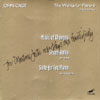Cage Music of Changes; (7) Haiku; Suite fo Toy Piano
How can a pianist dazzle with just nine notes from which to choose?
View record and artist detailsRecord and Artist Details
Composer or Director: John Cage
Genre:
Instrumental
Label: Mode Records
Magazine Review Date: 3/2006
Media Format: CD or Download
Media Runtime: 43
Mastering:
Stereo
DDD
Catalogue Number: MODE147

Tracks:
| Composition | Artist Credit |
|---|---|
| (7) Haiku |
John Cage, Composer
John Cage, Composer Martine Joste, Piano |
| Music of Changes |
John Cage, Composer
John Cage, Composer Martine Joste, Piano |
| Suite |
John Cage, Composer
John Cage, Composer Martine Joste, Piano |
Author: Peter Dickinson
This next volume in Mode’s massive Complete Cage Edition shows sharp contrasts even though all three works date from 1948-52. The earliest, the Suite for Toy Piano, is Cage at his most accessible and distinctly under the influence of Satie. The toy instrument has a range of only nine notes so there is little scope for pianistic extravagance. Some pieces from the suite, which gets a scrupulously accurate performance, could profitably be set for the more elementary piano examinations.
The longest of the Seven Haiku lasts only 19 seconds, which makes Webern seem distinctly long-winded. However, the snippets are separately tracked in case you didn’t catch one the first time, and the title draws attention to the increasing oriental influence in Cage to supplement his respect for Webern.
The four sets of the Music of Changes were written for that incredibly dedicated interpreter of Cage, David Tudor. Where would Cage have been without him? Tudor’s recording is no longer available but comparison with Steffan Schleiermacher is instructive. With the score’s eccentric notation, it’s hard enough just to follow it in such a volatile continuity – stopping dead at times then exploding wildly in all registers with elaborate use of all three pedals and resulting resonances. Schleiermacher, whose Cage series is truly remarkable, has a slightly wider dynamic range but Joste has the measure of these exploratory documents, which stand alongside Boulez on the frontiers of avant-garde pianism. Unfortunately the booklet-notes by that dedicated Cage enthusiast Daniel Charles are at times incomprehensible.
The longest of the Seven Haiku lasts only 19 seconds, which makes Webern seem distinctly long-winded. However, the snippets are separately tracked in case you didn’t catch one the first time, and the title draws attention to the increasing oriental influence in Cage to supplement his respect for Webern.
The four sets of the Music of Changes were written for that incredibly dedicated interpreter of Cage, David Tudor. Where would Cage have been without him? Tudor’s recording is no longer available but comparison with Steffan Schleiermacher is instructive. With the score’s eccentric notation, it’s hard enough just to follow it in such a volatile continuity – stopping dead at times then exploding wildly in all registers with elaborate use of all three pedals and resulting resonances. Schleiermacher, whose Cage series is truly remarkable, has a slightly wider dynamic range but Joste has the measure of these exploratory documents, which stand alongside Boulez on the frontiers of avant-garde pianism. Unfortunately the booklet-notes by that dedicated Cage enthusiast Daniel Charles are at times incomprehensible.
Discover the world's largest classical music catalogue with Presto Music.

Gramophone Digital Club
- Digital Edition
- Digital Archive
- Reviews Database
- Full website access
From £8.75 / month
Subscribe
Gramophone Full Club
- Print Edition
- Digital Edition
- Digital Archive
- Reviews Database
- Full website access
From £11.00 / month
Subscribe
If you are a library, university or other organisation that would be interested in an institutional subscription to Gramophone please click here for further information.




